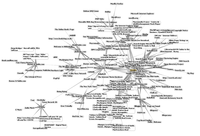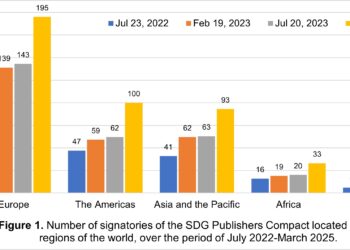
- Image via Wikipedia
Recently, there has been a great deal of hand-wringing over the Google Books Settlement. My view is that it’s not a huge deal for authors or publishers to have their content indexed by Google and shown in snippets. We’re so worried about where our content goes that we’re missing the point. For Google, content is only a means to an end. What they are dominating and appropriating is distribution.
In a brilliant post on his Publishing 2.0 blog, Scott Karp elucidates (with the help of Nick Carr) how Google is dominating the Web and why a site like Google can be so dominant while owning no content of its own. In fact, it wants to send people away. Why is this? Because Google dominates distribution by dominating linking.
In the prior information era, publishers controlled linking in a sense, because we knew who wanted what through our mailing and subscription lists. Publishers had a special place in the analog world because we could scale the scarce resources and expensive arrangements necessary for mass printing and large-scale distribution. In that era, the postal service didn’t own any content — it earned its money by linking provider to customer through distribution. But the postal system could only take it so far — physical limitations capped the scalability of the system.
Linking was power. And it still is, but on a much grander scale and in new ways, using techniques publishers of all stripes don’t fathom. As Nick Carr puts it:
For much of the first decade of the Web’s existence, we were told that the Web, by efficiently connecting buyer and seller, or provider and user, would destroy middlemen. Middlemen were friction, and the Web was a friction-removing machine.
We were misinformed. The Web didn’t kill mediators. It made them stronger. The way a company makes big money on the Web is by skimming little bits of money off a huge number of transactions, with each click counting as a transaction. (Think trillions of transactions.) The reality of the web is hypermediation, and Google, with its search and search-ad monopolies, is the king of the hypermediators.
Friction is harvestable energy, and Google is harvesting it by the boatloads. How Google dominates linking is how it dominates distribution. As Karp puts it:
The greatest irony of the web content economy is that Google by itself doesn’t have a clue what content is good or bad. Google is able to deliver relevant search results only because every site on the web helps them figure it out.
Google’s algorithm is based on reading “links” as votes for content. Every time a website links to another website, Google reads that link as a vote. The brilliance of the Google algorithm is its ability to figure out which votes should count more.
But without those links, without those “votes,” Google has nothing.
What Google “steals” from every website isn’t the content — it’s the links.
It’s the links, stupid. And everyone gives Google their links to read — for free!!
The genius of Google’s approach is that the more content there is on the web, the less value each piece has because each provider has less and less of a chance of making enough money to survive. Meanwhile, each content piece has links, and Google harvests these to continue to dominate distribution. Linking is the intellectual property that Google is appropriating, shutting publishers out of the old model that relied upon them dominating distribution.
You might sense a tingle of rebellion here. Karp does as well:
The balance of power on the web can shift — but only by understanding what the real sources of power are.
So content providers shouldn’t be up in arms over such prosaic issues as copyright and content presentation. Those things hardly matter online. Instead, they should know why Google really wants that content up there — so there are more links, so there is more clicking, and so Google can continue to grow its business following the linking and distribution breadcrumbs we and our users create at no cost to them.
Discussion
6 Thoughts on "Google Wants Your Links, Not Your Content"
Speaking of the Google Books settlement, there’s an interesting article on how things have shaken out that’s likely to give Google a perpetual monopoly on access to the world’s orphan works:
http://techliberation.com/2009/04/06/limited-and-temporary/
![Reblog this post [with Zemanta]](http://img.zemanta.com/reblog_e.png?x-id=65deea86-e0de-4fcf-8839-9a77649d9934)


